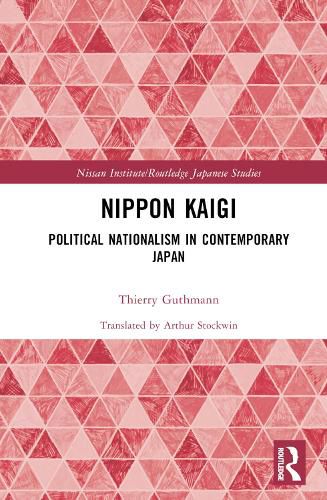Readings Newsletter
Become a Readings Member to make your shopping experience even easier.
Sign in or sign up for free!
You’re not far away from qualifying for FREE standard shipping within Australia
You’ve qualified for FREE standard shipping within Australia
The cart is loading…






This book examines political nationalism in Japan through an in-depth analysis of the organisation, ideology and influence of Nippon Kaigi, the most significant nationalist pressure group in contemporary Japan.
Starting with a review of political nationalism in Japan since 1945, the book then analyses the ideological corpus of Nippon Kaigi, highlighting its unity and coherence as a pressure group and assessing the real influence it exerts on Japanese political life. It goes on to examine the relationship between religion and nationalism and the key role played by various religious organisations within this pressure group, explaining why religious movements that should be in competition with each other manage to collaborate within Nippon Kaigi. Finally, the book turns to the characteristics of Japanese nationalist circles and an assessment of the rise of nationalism in contemporary Japan.
Featuring extensive firsthand interviews with individuals and organisations close to Japanese nationalist circles, this book will appeal to students and scholars of Japanese politics, nationalism and the sociology of religion.
$9.00 standard shipping within Australia
FREE standard shipping within Australia for orders over $100.00
Express & International shipping calculated at checkout
This book examines political nationalism in Japan through an in-depth analysis of the organisation, ideology and influence of Nippon Kaigi, the most significant nationalist pressure group in contemporary Japan.
Starting with a review of political nationalism in Japan since 1945, the book then analyses the ideological corpus of Nippon Kaigi, highlighting its unity and coherence as a pressure group and assessing the real influence it exerts on Japanese political life. It goes on to examine the relationship between religion and nationalism and the key role played by various religious organisations within this pressure group, explaining why religious movements that should be in competition with each other manage to collaborate within Nippon Kaigi. Finally, the book turns to the characteristics of Japanese nationalist circles and an assessment of the rise of nationalism in contemporary Japan.
Featuring extensive firsthand interviews with individuals and organisations close to Japanese nationalist circles, this book will appeal to students and scholars of Japanese politics, nationalism and the sociology of religion.